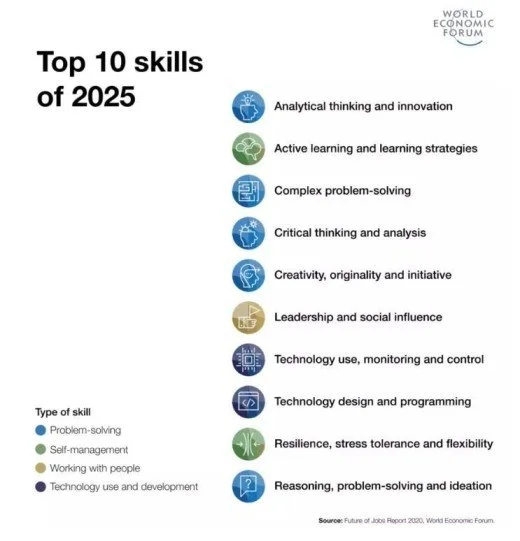#12: The Power of Inquiry in Leadership
“For teams to develop and grow, having time and space to ask complex questions is necessary.”
LISTEN NOW:
Harvard Business Review IdeaCast: Episode 962- Are You Asking the Right Questions
Synopsis: Using multiple real-life examples from different industries, Arnaud Chevallier, strategy professor at IMD Business School, shares how when leaders don’t ask the right type of questions, it impacts success. However, when asking the right questions, leaders can guide their organizations and teams to move forward and maximize the impact that they have.
Over the past several blog posts we have been looking at how the type of questions we ask, along with backwards planning, can reshape the ways we move towards goals we have. When we use these tools, not only do they lead us to be more effective, but ultimately we have more success in what we pursue.
While we have been using program development and instructional design as our medium to demonstrate how these tools work in tandem, in reality, these tools are life skills and are relevant across all professions, transferable to any industry or workplace. In this post, we will return to where we started and discuss how the type of questions we ask impact leadership and team growth.
Why We Should Be Encouraging Questions
Time is a limited commodity and as result, often when leaders and teams are gathering information to make a decision, the type of questions asked are crucial. Often though, it pays to pause and consider asking ourselves, what are we really seeking to define? Are the questions being asked really the ones that will move us to where we want to be?
According to the World Economic Forum 2025, the top 10 skills of 2025 relate to analytical and critical thinking, creativity, reasoning, ideation, and complex problem solving. Yet for teams to develop and grow in these areas, having time and space to ask complex questions is necessary.
In 2020, the WEF predicted these skills to be essential for 2025
In 2025, businesses have shared these are the skills they are seeking from their employees. Reasoning, problem solving, and innovation were embedded into creative and analytical thinking.
In inquiry, teams learn through curiosity, discovery, and collaboration. It’s critical to not just gather information, but also look for alternative perspectives, and help surface critical questions that may be overlooked about the situation one is facing. This can only occur when we take time to consider the type of questions that we are asking.
Whether you’re leading a team or a project, you may not know all the questions to ask or have all the answers - in fact, few would expect that you would. The most impactful leaders often surround themselves with individuals who are competent, capable, and ‘smarter’. What these leaders do that is different, which encourages their teams or the projects they lead to grow, is draw attention to areas that may have been overlooked in the inquiry process so that those they are working with, can raise the questions.
What Are You Really Asking?
To ensure that teams are asking the right type of questions, it’s important to recognize that there are many types that can be asked. As shared in an earlier blog post, often the various types of questions we may ask actually compliment one another and one is not ‘better’ than the other. In fact, when used together, they are able to help build a strategy moving towards the goals we may have.
However, it’s also important to remember, whenever we ask one type of question, we are choosing to not ask another type of question… so what are we really seeking to understand?
Harvard Business Review wrote a great article, The Art of Asking Smarter Questions, speaking to the importance of using inquiry as a way to identify issues that may be overlooked or missed. Without proper questioning techniques and intentional probing, leaders and teams often miss critical elements that are necessary for success because the right questions aren’t being asked.
In the article, the authors shared that often the types of questions we ask can fall into 1 of 5 categories. Similar to what has been shared throughout this series of blog posts (blog posts 9, 10, 11) looked at as a whole, you can see how these different types of questions fit into strategic thinking and backwards planning.
#12:
The Power of Inquiry in Leadership
5 Types of Questions:
Investigative- These questions help leaders and teams probe in depth into the problem or into the solution
Speculative- These questions help foster innovation by challenging the implicit and the explicit assumptions for the problem
Productive- These questions are often the ‘now what?’- they help create the plan that is needed to move forward
Interpretive- “So What”- this is the linchpin for success- it’s the “WHY” behind what you are doing
Subjective- These are the heart of the questions, the EQ side of the equation as teams are made of people and that emotion impacts the decisions and outcomes that we seek
Working on cross-cultural teams, the value in using a variety of these questions during program development is something I have learned to unpack and recognize. In some contexts, certain types of questions come more naturally than others. However, the most impactful leaders and teams I have worked with are those that understand the value of providing space and time to dive into all 5 types of questions. Identifying the type of questions that are being asked is critical to determine the type of information that is gathered. If questions posed are only of one type, often leaders and teams will walk into blind spots and as a result, the goals that they are working towards will be met with hurdles.
Final Thoughts…
Curiosity and active learning are key components to inquiry.
Returning back to the skills that the World Economic Forum 2025 talked about- analytical and critical thinking, creativity, reasoning, ideation, and complex problem solving are all packaged into the type of questions that we ask.
When leaders encourage teams to develop their skills in inquiry and questioning, it creates a more engaged team. Individuals feel more comfortable asking questions and contributing ideas. A sense of safety for teams is built so that assumptions that may hinder progress are challenged and fresh perspectives are encouraged. When these mechanisms are in place, there is more buy-in and ownership of the work that is taking place as individuals become more invested in their roles.
As leaders encourage an inquiry spirit in organizations and teams, whether it’s strategizing a new initiative or developing/ refining a program, teams will grow and flourish- often walking away with information, ideas, insights, and solutions that may have been passed over otherwise.





